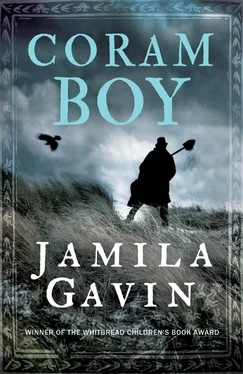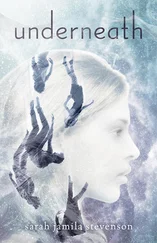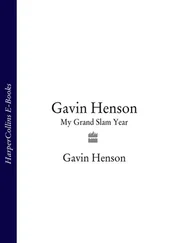‘The little girl’s birthday dawned and she was all decked out in nut-brown velvet trimmed in red. The gentleman and his fine lady set off for the church with their pretty little daughter between them.
‘They sat in the front pew and said their prayers. The organ played, the choir sang. The minister raised his hand to give the blessing and make the sign of the cross, but he was interrupted. The east door of the church swung open. Everyone turned to see who had arrived so late. There standing in the threshold were six little girls, all dressed in nut-brown velvet trimmed in red. All were identical to the fine lady’s daughter.
‘At the sight of them, the fine lady gave one dreadful scream and fell down dead.’
The children clustered round the nursemaid were silent as she ended.
‘That’s a sad story,’ one whispered at last.
‘It’s a sad world out there,’ agreed the nursemaid. ‘Now come on, Nanny says it’s time for bed.’
There came six maids on their knee. When do they come? They come by night as well as by day, To take your little child away.
My little child is yet too young, To stay away from his mam. Whether he’s old or whether he’s young We’ll take him as he am.
Part One – 1741
Chapter One  The Coram Man
The Coram Man
‘Oi! Meshak! Wake up, you lazy dolt!’ The sound of the rough voice set the dogs barking. ‘Can’t you see one of the panniers is slipping on that mule there! Not that one, you nincompoop,’ as the boy leapt guiltily from the wagon and darted in an agitated way among the overloaded animals, ‘that one – there – fifth one back! Yes. Fool of a boy. Why was I so cursed with a son like you? I don’t have to have eyes in the back of my head to know that one of the mules had his load slipping. What goes on inside that addled brain of yours?’
A man and his boy were coming out of the forest with a wagon and a train of six mules. They were heading for the ferry at Framilodes Passage, which would take them across the River Severn and on to the city of Gloucester.
‘Why I don’t ditch you is more than I can say. Thank your lucky stars that blood is thicker than water. Tighten him up properly. Don’t want no hold ups now. We can just catch the ferry before nightfall if we hurry!’
Otis Gardiner, pots man, Jack-of-all-trades and smooth-tongued entrepreneur, ranted non-stop. It was a side of Otis that not everyone saw; he could be so attractive, so charming, so sweetly spoken. A young man still, he had wide, appealing, brown eyes and shoulder-length red-brown hair drawn back to show off his broad, handsome brow. He could barter the hind leg off a donkey – especially if the donkey was a lady. By flirting with the wives, bantering with the gentlemen, demonstrating magic tricks to little children, he could persuade a customer to part with twice as much money as they should, all the while making them think they had themselves a bargain.
Meshak tightened the straps round the mule’s belly. He ignored the faint kitten-like wails which came from the sacks and tried not to look at the sneering face of the man he called his father. From his driving seat Otis peered round the covered wagon and flicked his whip at him. Jester, the brown scraggy lurcher, shadowed Meshak among the mules as the boy tried to compensate for his negligence by meticulously checking all the panniers. The other dogs, tied to the wagon by bits of string, barked their heads off and leapt and twisted in a frenzied bid to pull free. They didn’t calm down till Meshak and Jester were back on the wagon.
Meshak was an awkward lad. At fourteen he was taller than his father and growing. But he looked as if he had been put together all wrong; his body was all over the place, his head too large, his ears too sticking out, his lips never quite closing. There seemed always to be a sleeve at his runny nose. His arms and legs dangled from his body, uncoordinated and clumsy; he dropped things, tripped over things, fumbled and stumbled. All this meant that people – especially his father – shouted at him, cuffed him, jeered and sneered at him, so his whole look was that of a cowering dog. If he had had a tail, it would have always been between his legs, as he slunk by waiting for the next kick. He had a vulnerable, infantile look, with his pale-freckled face beneath a stack of wild red hair, and his large, watery, blue eyes, which often stared round at the world with incomprehension. But no one ever saw him cry or laugh. People called him a simpleton – a loon – and wondered why his father hadn’t abandoned him years ago. People assumed that he was nothing but an empty vessel, lacking in all substance, feeling or emotion; neither able to love nor in need of being loved.
How could Meshak speak of his terrors? There was no one to tell except Jester. He saw trolls and witches; evil creatures crouching in shadows, lingering round trees, hanging in the sky; demons with hairless heads and glinting teeth. He never knew when they would come to poke and prod him, to torment his sleep and rampage through his head. Even now, the darkness of the forest they had just left behind seemed to be creeping down the road after them, gobbling up their tracks, soon to consume them too.
His father was mean with the lamps and only kept one up in front for the road ahead, so Meshak hated being out on the highway at night. He was afraid of the dark. It was not just the spirit world which frightened him, but the real world of robbers and highwaymen, especially near the forest. And then there were the wild animals. He hated the green eyes which glimmered in the dense undergrowth, and the scufflings and gruntings of unseen creatures stalking among the trees.
Most of all he hated the pathetic squeals which came from the sacks bumping against the scraggy flanks of the mules, and the task Otis and he often performed at night in some bleak lonely place. He never told anyone of the frightful nightmares he had, and how he had learnt to smother his gasping whimpers lest he woke his father. He never told anyone of the faces and voices and clutching fingers of all those children, who drifted like lost spirits through his dreams.
He glimpsed the tall towers of Gloucester Cathedral in a distant smoky haze, and his heart leapt. He loved churches because there were angels there, sometimes within gleaming stained-glass windows or out in the graveyards; stone angels with gentle hands and loving faces. He would go to the cathedral as soon as he could and find his favourite angel. His father would usually abandon him in the city and go off for days on end, making his deals, meeting his contacts, disappearing into the pubs and taverns to indulge in gambling, dog-baiting, womanising and furthering his career. Meshak knew his ambition was boundless. He would not stay a pots man. Meshak, mean-while, would live and sleep in the wagon. With the few pence he was given, he could fend for himself, especially as he always had Jester.
‘Get on up front, boy!’ A yell from his father indicated that he had spotted someone on the roadside. Otis liked to have his ‘idiot’ son up next to him during certain transactions. It gave him the air of being a devoted and caring father; a man you could trust and entrust with secrets. Meshak dutifully climbed up next to him.
With a shock of pleasure he saw the vast shining back of the river, so close now. The first tremulous lights of the fires and torches were being lit along the riverbank as dusk deepened into evening. Great hulks of ships brooded at anchor, and small craft scuttered like insects to and fro across the surface. Silhouetted tall and stiff as a scarecrow was the ferryman standing on his punt with pole in hand, about to embark with a full load of passengers, sheep and mules and baskets of goods. Corgis barked and scuttled in and out of the other animals’ legs to keep them from bunching together.
Читать дальше

 The Coram Man
The Coram Man










